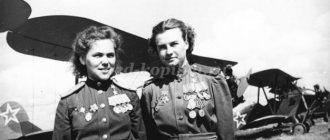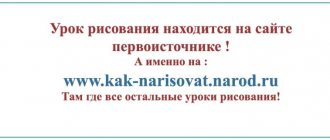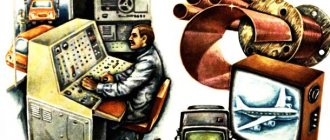Summary of educational lesson for senior preschool age “Victory Day”
Lesson for Victory Day on May 9 for children in the senior group of kindergarten (5-6 years old)
Description Dear colleagues, I bring to your attention a summary of an educational lesson dedicated to Victory Day. This material may be useful for preschool teachers and is intended for children of older preschool age. Goal: To develop patriotic feelings among older preschoolers. Objectives: Educational: • Expand children's ideas and knowledge about the Great Patriotic War, Victory Day; • Expand children's horizons and ability to empathize with other people; • Encourage respect for the heroism of our soldiers. Developmental: • To develop in children imagination, observation, curiosity, the desire to learn more new, useful, interesting things; • Development of memory, attention, speech, thinking. Educational: • To cultivate a sense of patriotism, love for one’s Motherland, respect for WWII veterans, a desire to take care of them; • Fostering tolerance. Integration of educational areas: socio-communicative development; cognitive development; speech development; physical development. Types of children's activities: play; educational; productive; social - communicative; motor. Bilingual component: Defender, Motherland, Fatherland, warriors, raid, bombs, bomb strike, banners, veterans, partisans, memorials, honor the memory. Preliminary work: Examination of photo albums “Battle of Stalingrad”, “Capture of Berlin”, illustrations about the Great Patriotic War, examination of monuments to fallen heroes. Conversations about soldiers, learning poems, songs and listening to music about the Great Patriotic War. Meeting with veterans - participants of the Second World War. Equipment: Story pictures, postcards depicting monuments, memorials dedicated to the heroes of the Great Patriotic War, a set of demonstration material “Victory Day”, Audio recordings of musical works about the war, a song by D. Tukhmanov to the verses of V. Kharitonov - “Victory Day”, story by L .Kassilya “No one knows, but everyone remembers.” Methods and techniques: Verbal method.
Visual method. Game method. Progress of GCD
1. Organizational moment. Introductory word from the teacher. Educator (reads a poem) We have a lot of holidays, There are a lot of good holidays, But I repeat every time, That this day is the beginning of everything, What without it, what without it And the world would not know the happiness of the world And there would be nothing If there had been no Victory ! 2. Main part. Introduction to the topic. Conversation about Victory Day. Educator: Guys, who can tell me what holiday we celebrate on May 9?
Educator: That’s right, why is it called “Victory Day”? Well done! And now I will tell you how the war began. The song “Holy War” plays (music by A. Alexandrov, lyrics by Lebedev-Kumach)
We listen to the first verse, and then the teacher talks along with a barely audible continuation of the song. Educator: Once upon a time, when your great-grandparents were still small, our country was attacked early in the morning of June 22, 1941 by evil enemies - the Nazi invaders.
Their main leader, Hitler, gathered his army, armed it with tanks, planes, machine guns and attacked our country.
The Nazis wanted to make our people slaves. They wanted to capture Moscow, the capital of our Motherland.
The entire people stood up to defend the country. This is how the Great Patriotic War began.
Why is it called that? Because the entire people, young and old, stood up to defend their Fatherland, their Motherland. There were difficult battles, many people died, but the enemy did not get into Moscow.
The Great Patriotic War lasted 1418 days.
The fascist barbarians destroyed and burned the cities, villages, and schools of our Motherland. Fascist planes bombed cities and ports, airfields and railway stations, bombs rained down on pioneer camps, kindergartens, hospitals and residential buildings.
The enemy spared neither women, nor the elderly, nor children. A lot of people died in this terrible war.
Our soldiers fought not only at the front. Civilians behind enemy lines tried to inflict as much damage as possible on the invaders. They set fire to warehouses with enemy military equipment and attacked their headquarters to find out information about the enemy’s actions. Such people were called partisans.
And finally the long-awaited day came when our army cleared the land of fascists and captured the main city of Germany, Berlin. (Showing the illustration “The Capture of Berlin”)
On May 9, 1945 the war ended with our victory
Victory Day is the most solemn, sad and joyful holiday for our people; it is dedicated to the Great Victory over fascism. We remember with gratitude our glorious warrior-defenders who defended the world in a fierce battle.
We owe it to soldiers, sailors, lieutenants, captains, and generals that we now live under a clear, peaceful sky. Eternal glory to them!
The recording of the song “Victory Day” is played. — What holiday is the song sung about? (Children's answers) Educator. Which of you can read poems about Victory Day? Child. The May holiday - Victory Day is celebrated by the whole country. Our grandfathers put on military orders. In the morning the road calls them to the solemn parade. And thoughtfully from the threshold the grandmothers look after them. Child . What is Victory Day? This is the morning parade: Tanks and missiles are driving, a line of soldiers is marching. What is Victory Day? This is a festive fireworks display: Fireworks fly into the sky, scattering here and there. Educator: Many years have passed since the last shot of the Great Patriotic War rang out, but images of people dear to us remain in our memory. Those who gave their lives for a future in which there is no war. On this bright holiday, we pay deep tribute to those who walked the difficult roads of war, who returned from the front, restored the country, wounded and destroyed. The memory of these people should live not only in the obelisks and the unquenchable fire of the Great Victory, but also in our hearts. With sadness and gratitude we remember the heroes, all of them, who gave their youth, hearts, thoughts to a great feat and defeated fascism. Physical exercise: Like soldiers on parade, We walk row by row, Left one, right one, Look at us, everyone. We clapped our hands - Together, have fun. Our feet started pounding - Louder and faster! Let's hit you on the knees - Hush, hush, hush! We raise our arms, our arms - Higher, higher, higher. Our arms began to spin and dropped again. We circled around and stopped. Educator: Guys, who do we congratulate on Victory Day? (Children's answers) Educator: True, veterans of the Great Patriotic War, those people who fought, worked in the rear - in factories, built railways, tanks, airplanes, made weapons. -How do people remember those who defended their country? (Children's answers) Educator: Yes, monuments are erected to them, poems, songs, and stories are dedicated to them. The names of the soldiers who defended our Motherland should not be forgotten. Educator: I want to tell you about one memorable place - the Tomb of the Unknown Soldier, which is located in the Kremlin, in the Alexander Garden. No one knows his name, but everyone knows that he fought bravely and why the unknown soldier died. So now the Eternal Flame burns without going out! (Showing the illustration “Eternal Flame”)
(The teacher reads L. Kassil’s story “Nobody knows, but everyone remembers.”) - What did you learn from this story? (Children's answers) - What do people think about when they stand near the Tomb of the Unknown Soldier? (Children's answers) Educator: Listen again to how it sounds: “We are thinking here about how we should live, study, work in order to make our life even better and more beautiful, so that our country becomes even stronger and stronger, so that we never Enemies dared to attack her, and so that there would always be peace on earth!” Peace is the most important word in the world. Our planet really needs peace. Adults need peace, children need peace, everyone needs peace! Educator: Not all the soldiers returned home. Many died defending the land from enemies.
People do not forget their heroes. Songs are sung about them, poems are dedicated to them. Many monuments were erected in their honor. One of them is located near the Kremlin wall. This is the “Eternal Flame” - a monument to all soldiers who fought the Nazis. The eternal flame is a constantly burning fire, symbolizing the eternal memory of the exploits of our brave soldiers.
How many of you know and can read a poem about monuments and obelisks? Child: “No one is forgotten and nothing is forgotten” - Burning inscription on a block of granite. The wind plays with faded leaves and covers the wreaths with cold snow. But, like fire, at the foot there is a carnation. No one is forgotten and nothing is forgotten. Child: Above the grave, in a quiet park, tulips bloomed brightly. The fire is always burning here, The Soviet soldier is sleeping here. We bowed low and low at the foot of the obelisk, Our wreath blossomed on it with a hot, fiery fire. 3. Game “Our Parade” Invite children to march to the music “Victory Day” with flowers. After the parade, lay these flowers at the illustration of the monument to the victorious warrior. (Showing an illustration of a monument to a victorious warrior.) Educator: Guys! In a couple of days there will be a great holiday - Victory Day! Someone will spend it with their family, remembering their relatives and friends who had the opportunity to meet the War. Many of you will go to the parade with your parents. If you see a person with orders on May 9, then go up and congratulate him on the holiday, tell him “Thank you!” for the fact that he defended our country, our homeland from enemies. Veterans will be pleased that we all remember that difficult, wonderful victory.
And now our lesson ends. List of references used 1. Approximate basic general education program for preschool education “From birth to school.” Edited by N.E. Veraksa, T.S. Komarova, M.A. Vasilyeva. Edition 2 – revised and expanded. Moscow “Moscow – Synthesis”, 2011. 2. T.Yu. Bardysheva, E.N. Monosova, Speech therapy classes in kindergarten. Preparatory group for school. Moscow Publishing house "Scriptorium 2003" 2011. 3.N.N. Leonova, N.V. Netochaeva, Moral and patriotic education of older preschoolers. To help the teacher. Volgograd 2013. 4. Vetokhina A.Ya., Dmitrenko Z.S., Zhingal E.N., Krasnoshchekova G.V., Podoprigora S.P., Polynova V.K., Savelyeva O.V. Moral and patriotic education of preschool children. Planning and lesson notes. Methodological manual for teachers. - St. Petersburg: "LLC PUBLISHING HOUSE "CHILDHOOD - PRESS", 2010. 5. Poems of Soviet poets dedicated to the war: portal for parents "Ladushki - ladushki", "Russian poetry" - rupoem.ru.
We recommend watching:
Scenario of a thematic lesson on May 9 in the senior group Notes on fine arts in the senior group “Festive fireworks” Notes of a lesson in the senior preparatory group on the topic: May 9 - Victory Day Notes of a conversation in the senior group dedicated to the liberation of the city of Surovikino from the Nazi invaders
Similar articles:
Lightning in kindergarten on May 9th. Scenario for senior group
Lesson notes for the senior group. Battle of Stalingrad
Thematic lesson for Victory Day - May 9 in kindergarten in the senior group
Scenario for a thematic lesson dedicated to May 9 in the senior group “War... We will never forget it!”
Description of the material : I offer you a scenario for a thematic lesson dedicated to the holiday of May 9, for older children (5-6 years old) on the topic: “War... We will never forget it!” This material provides for the development of patriotic education in preschool age. The material is interesting, easily understood by children, and will be useful for teachers of older preschool age. Summary of a thematic lesson in the senior group on the topic “War... We will never forget it!” Integration of areas: educational areas “Cognitive development”, “Speech development”, “Socio-communicative development”. Goal: To foster a sense of pride in one’s homeland. Program objectives: 1. Educational: To introduce children to the tradition of celebrating Victory Day; Expand children's understanding of the Russian army and war veterans. Promote the harmonization of parent-child relationships. 2. Developmental: Expand gender ideas, develop in boys the desire to be strong, courageous, and become defenders of the Motherland; Develop mental activity: thinking, imagination, memory; Develop children’s speech activity, encourage the desire to reason, express their opinions; Improve coordination of movements, develop dexterity, speed, ingenuity and accuracy in children. 3. Educational: To educate in the spirit of patriotism, love for the Motherland; To instill in children respect for veterans, current defenders, and future defenders of the Motherland. Didactic material: Demonstration: Multimedia projector, screen, presentation: “Presentation about the war”; Peni track:
“Holy War”, music.
A. Alexandrova; track of the song
“Dark Night”, music by N. Bogoslovsky, lyrics by V. Agatov;
track of the song
“Victory Day!”
composer David Tukhmanov and poet Vladimir Kharitonov; Lighted candle; gallery with photos of obelisks and monuments in the cities of heroes of Russia. Handout: lilac branches and flowers; balloons according to the number of children; Preliminary work: Conversation with children on the topic: “At what cost did we get the Victory?” The teacher's story about the difficult but honorable duty of the defenders of the Motherland, to protect its peace and security; Conversation with children on the topic: “How our great-grandfathers, grandfathers and fathers bravely fought and defended our country from enemies during the war years” Reading Russian folk epic: “Ilya Muromets and the Nightingale the Robber” Reading: E. Uspensky “A Terrible Story”, “Memory” "; S. Romanovsky “On tanks”, S. Alekseev “First night ram”, E. Vorobyov “Broken wire”. Memorization: E. Blaginina “The Overcoat” Making riddles about the army and branches of the military. Examination of a reproduction of the painting “Bogatyrs” by V. Vasnetsov. Listening: “Cavalry” music. D. Kabalevsky. Drawing on the theme: “Border guard at the border”, “At the obelisk!” Modeling on the theme: “Border guard with a dog” Application on the theme: “Military equipment” Outdoor games: “Running”, “Shootouts”, “Who is more dexterous?”, “Whose team will win?” Co-role-playing game: “Army”, “Package for commander”, “Victory Day!” Board games: “Travel on the map”, “Complete the task”, “Clear the field” Vocabulary work: veterans, obelisk. Methods and techniques used: Teacher's story, explanation, questions to children, answer-reasoning, ICT, gaming methods and techniques, surprise moment meeting with a veteran. Characters: teacher, children.
Progress of the thematic lesson
“War... We will never forget it!” War is too big a disaster.” Presenter: On May 9, all our people celebrate a great holiday - Victory Day. Many years have passed since German troops attacked Russian soil. Our people, young and old, men and women, even children, began to defend our Motherland from the enemy. 1. The phonogram of the song
“Holy War” sounds, music.
A. Alexandrova. Get up, people! Hearing the cry of the Earth, the soldiers of the Motherland went to the front. The soldiers bravely went into battle for every city and for you and me! They wanted to take revenge quickly For the elderly, for the women, for the children! Presenter: “Get up, huge country.” This music, these words were familiar to every person during the war. This song was a call to battle, to fight the enemy. We remember with gratitude our warrior defenders who defended the world in a fierce battle. We owe it to all our defenders, today's veterans and those who are not with us, that we now live under a peaceful, clear sky. Eternal glory to them! MONTAGE: Victory Day is the holiday of our grandfathers. Their feat illuminates our path. Let's say to everyone: “Thank you for the Victory!” There are very few veterans now. Our grandfathers accomplished a feat - they recaptured their homeland from the Nazis! And no matter how many years pass, their feat lives in our hearts. Let's remember everyone who did not return from the battle, Let's remember them silently, of course standing. Let their eternal fire burn. And he says thank you on our behalf. Our grandfathers fought fearlessly, To free the land from the enemy, Therefore, a great Victory Day! And we will never forget their feat! Victory Day is a great day! So many years have already passed, This joy is not forgotten, Our souls are warm. We say “thank you” to grandfather, For the life we live. Today we celebrate Victory! And we sing songs together! The children take their seats. A presentation about the war comes on. Host: On cold autumn evenings, in moments of calm between battles, the soldiers rested, sitting by the fire, mending their clothes, cleaning their guns, remembering peaceful days, singing songs and writing letters to their relatives. A letter from the front from a son to his mother. 2. Read to the soundtrack of the song “Dark Night”
Hello, dear mother.
Your son is writing to you. I'm fine. Yesterday we repulsed the enemy's attack. A lot of our soldiers died. Every day we move further and further towards Stalingrad. The German holds defeat. When there is no battle going on, soldiers sit and dream about when they will return home to their beloved wife, mother and children. And never see these battles again. Many people are now dying of hunger. Because we are not receiving food due to heavy rains. All the roads are in ruins, the vehicles cannot get to our division and cannot even take out the wounded. Mom, how I miss home. When I fall asleep, I dream of our house, garden and you, mother, in white. I have that dream every time. I am finishing my letter. Goodbye. Your beloved son. Host: And the soldiers also remembered their wives, beloved girls, sisters, mothers. They remembered how good, cozy, warm it was with them at home. They knew that they were waiting for them from the war, they believed that they would return alive and with VICTORY! And this always made my soul warmer. Such letters were necessary for the soldier. It is no coincidence that the girl Katyusha from the song that everyone now knows, both adults and children, became a symbol of fidelity and hope. This song turned out to be dear to everyone. And during the days of the war, the soldiers nicknamed the formidable artillery weapon “Katyusha”, which the enemies were terrified of. 3. Children sing the song “Katyusha” Presenter: Many children went to the front straight from school. The war scattered young guys - some to become tankers, some to become anti-aircraft gunners, some to become telephone operators, some to become scouts. Presenter: Shells exploded with a roar, machine guns fired, tanks rushed into battle, crushing everything around. The earth was on fire. People gave their lives for their native country, We will never forget those who fell in valiant battle. Many soldiers did not return home from that war. We will never forget the heroes: no matter how many years pass, descendants will always cherish the memory of their fathers and grandfathers and thank them for defending the world in the name of our bright life! Let's remember all the fallen heroes and bow our heads before their feat! A minute of silence is announced! Presenter: (with a lit candle): Look, children, at the hot candle. Do you see how the flame trembles? There is a fire that evokes special feelings and special memories in people. This is the fire on the Tomb of the Unknown Soldier. Children go out to the gallery, where they look at the image of the eternal flame and monuments in the heroic cities. There are many such graves on our land. Soldiers who died during the war are buried in these graves. People will always remember that the fallen soldiers defended their Motherland, their relatives and friends, their children, grandchildren and great-grandchildren. In honor of the victory over fascism, the Eternal Flame burns so that people do not forget about the exploits of our heroes. To the Heroes of Victory - thank you!!! - two children say THANK YOU TO THE HEROES, THANK YOU TO THE SOLDIERS FOR GIVING PEACE, Then - in forty-five!!! You are blood and sweat. We got VICTORY. You were young, now you are already grandfathers. WE WILL NEVER FORGET THIS VICTORY!!! May the sun be PEACEFUL. Shines for all people!!! May there be happiness and joy. They live on the planet!!! After all, peace is very necessary - for both adults and children!!! Host: Thank you to our valiant soldiers for winning that cruel war. And so May 9th was proclaimed World Victory Day! 4. The phonogram of the song “Victory Day” plays. Presenter: And now we will go to the obelisk of memory in our village of Kanevskaya to lay flowers to all those who gave their lives for us, for our peaceful and bright future. And we will release these white balls into the sky as a symbol of peaceful life on earth.
We recommend watching:
Summary of a lesson in the senior group on the topic: Victory Day - May 9 Summary of a music lesson for May 9 - Victory Day in kindergarten in the senior group Summary of a thematic lesson for children of the senior group "Great Holiday - Victory Day" Lesson - a trip to the "Memorial Complex to the Heroes" WWII" with older children
Similar articles:
Scenarios for May 9 in kindergarten. Senior - preparatory group



